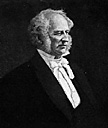The Invention of the Potato Chip
Potatoes were a food given only to animals in Colonial America. However, people began to eat them as well. They liked them cooked, usually, and a little on what we today would consider the bland side.
One of the ways that Americans increasingly liked to eat potatoes was fried. This was the case for many of the first years of the republic. Fried potatoes were even considered a delicacy in many parts of the growing country. Chefs or home cooks would add their own varieties of spices to the potatoes, preparing them by frying or otherwise heating. Potatoes were, for the most part, served in thick slices, so that they stayed on the fork and made it into the diner's mouth without breaking apart.
All that changed on a summer New York night in 1853.
 Commodore Cornelius Vanderbilt, who had made a name for himself in the railroad business and would later have a famous university named after him, was dining at Moon Lake's House, a resort in Saratoga Springs, N.Y. Being rich and famous, he was accustomed to getting his way. He was also a man who liked his potatoes.
Commodore Cornelius Vanderbilt, who had made a name for himself in the railroad business and would later have a famous university named after him, was dining at Moon Lake's House, a resort in Saratoga Springs, N.Y. Being rich and famous, he was accustomed to getting his way. He was also a man who liked his potatoes.
So on August 24, he ordered fried potatoes, as usual. But when the food arrived, Vanderbilt didn't quite like what he got. In fact, he thought the potato slices were much too thick. "Take them back," he told the waiter. He wanted thinner potatoes.
The chef at this particular resort at this particular time was a Native American by the name of George Crum. Now, Crum liked his cooking, and he liked the way he prepared his potatoes. Like any good chef, he knew a good thing when he saw it, especially when he had prepared it as well.
Not one to satisfy just any whim, Crum took the waiter's instructions and then stood them on their head. "If Mr. Vanderbilt wants thinner potatoes," Crum is sure to have said, "then I'll give him thinner potatoes."
What Vanderbilt got that night was potatoes sliced so thin that they were practically see-through. They were fried in hot oil and served, dripping, on a hot plate. In the kitchen, Crum was no doubt pleased with himself for "teaching that Vanderbilt a thing or two."
Vanderbilt was pleased himself. He loved those potatoes! He loved the texture and the taste. (Crum had lightly sprinkled them with salt.) He loved the crunch. (The paper-thin potatoes fried in hot oil created something crispy and crunchy.) Vanderbilt wanted more.
 Crum was astounded. So was the waiter, who was soon taking orders for the "Saratoga Chips." The idea spread across the country, and soon thousands of Americans were eating crispy, crunchy, paper-thin potato "chips."
Crum was astounded. So was the waiter, who was soon taking orders for the "Saratoga Chips." The idea spread across the country, and soon thousands of Americans were eating crispy, crunchy, paper-thin potato "chips."